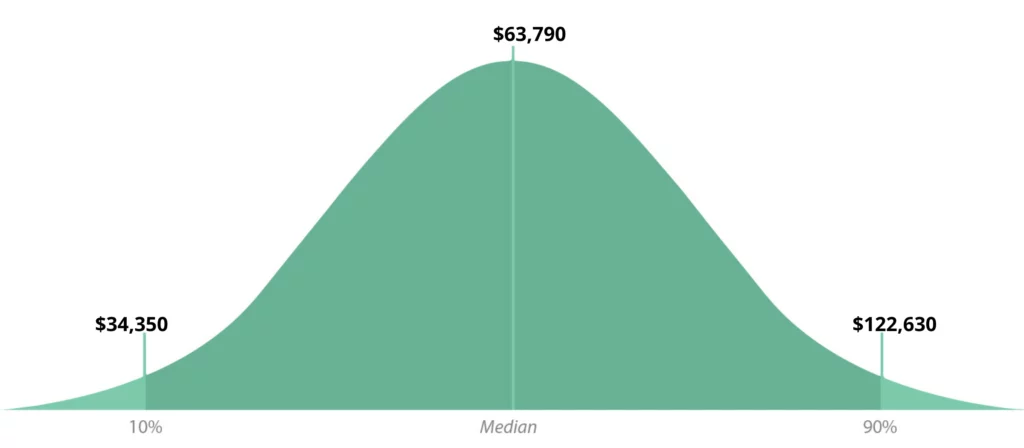
1. Overview: Job Responsibilities, Salary, and Common Requirements
2. A Comprehensive Guide to Becoming a Market Research Analyst
3. What Does a Market Research Analyst Do?
4. Signs You Should Consider Becoming a Market Research Analyst
5. How Do You Become a Market Research Analyst?
6. What are the Knowledge and Skills Needed to be a Market Research Analyst?
7. Popular Schools and Colleges in the U.S. for Aspiring Market Research Analysts
8. How to Get a Job as a Market Research Analyst
9. Learn About Geographic and Location Pay Differentials
10. Make Your Resume Stand Out
11. Ace Your Market Research Analyst Interview
12. Top Online Courses for Aspiring Market Research Analysts
Market research analysts made a median salary of $63,790 in 2019. The best-paid 10 percent made $122,630 that year, while the lowest paid 10 percent made $34,350.

Advertising Managers
Promotions Managers
Cost Estimators
Economists
Mathematicians
Statisticians
Operations Research Analysts
Public Relations Specialists
Survey Researchers
Analytical Skills
Critical Thinking
Communication
Skills in statistical software use
Data Collection
Data Analytics
Research
When you look at something you purchase–whether it’s a product or a service–do you ever wonder how it ended up for sale? Why did the company think of selling it in the first place? How did they know exactly what you needed and how you liked it? How do businesses come up with the decisions as to which products to sell?
The answer lies in market research analysis–something market research analysts are particularly good at. These professionals are responsible for determining market trends and consumer behavior, which leads to customers’ buying habits. They gather insights and decide on whether a product has potential or not.
Market research analysts are responsible for studying the market to see if a product or service has selling potential. They determine which types of customers will buy a product or service and how much they are likely willing to pay for it. Below are some of their detailed tasks and responsibilities:
Market research analysts play an essential role in any industry that they are in. They usually undertake important projects in manufacturing, charity, government, marketing, and industry. If they bring in a market research analyst for a project, trust that the project is of high value since it requires market analysis to ensure its success. Below are some of the most prominent features of a potential market research analyst:
As a market research analyst, you will be dealing with a lot of nitty-gritty details that comprise your main data. The little tidbits of information have the potential to make massive differences with how you analyze and come up with a conclusion. That means that you don’t let anything pass through you without eyeing and examining each piece of data.
A large portion of the data you will be gathering, sorting, and analyzing is made up of numbers. Being comfortable in dealing with numbers is a great advantage, if not an essential requirement, in performing well as a market research analyst. A lot of your analysis and presentations will also be in the form of graphs and charts, so you should also be adept at creating them.
One of the things that you should be interested in as a market research analyst is human behavior, particularly the ones that influence buying patterns. Keep in mind that the end-goal of your job is to make sure that the products you put out there and how you present it is most appealing to its audience. It should appear as desirable and therefore become as salable as possible since your analysis has proposed a method that taps into a consumer’s wants and needs.
If you believe that to achieve a result, there should be a rigid system of steps that you need to undertake to progress, then you are orderly enough to be an analyst. Having a scattered thought and working process will not do. Analysts work through an established system that ensures nothing is amiss and that everything has been properly accounted for. Working in a systematic approach such as that of Kaizen Agile development is a good example.
This approach in working is vital in doing market research analysis because there is no other way to go about the job and accomplishing consistently accurate results that yield profitable action. In a way, you have to be the type of person who wants things in proper order. If you’re the type who likes structure and following the exact steps in a procedure, then this job is definitely for you.
If you think you’ll be stuck doing reports all day in this career and you won’t need to face people, you are terribly mistaken. For one, you will possibly have to meet people to conduct interviews; and if you have research assistants to do this for you, they won’t be able to save you from presenting your analysis to clients and executives.
For that fact, you should be confident enough to do presentations in front of a group of people. Excellent speaking skills could come in very handy, and a knack at public speaking is even more advantageous.
If you can take professional-level information and explain it well to a fifth-grader, then you’ve got this vital trait. As an analyst, you will be dealing with a lot of complex data that only you or a fellow researcher would understand. Unfortunately, you won’t be presenting all that difficult data to fellow researchers, but to managers, marketers, and decision-makers who may not be as adept at research analysis as you.
As a consequence, you will need to adjust your presentation to their level of understanding to enable them to do their role and come up with decisions. You will find that being able to communicate your complex analyses garners better approval rates than if you presented it in its “raw” complicated form.

As you may already know, a market research analyst’s job requires a lot of brains and some experience. Therefore, you have to have accomplished certain things before you even consider applying. Below are the steps you can undertake to become this professional:
Several schools in different states offer degrees in marketing research and customer analytics. If you are confident that you want to become a market research analyst, you can track down these schools and apply for their marketing research programs. However, if you already have a bachelor’s degree in economics, mathematics, statistics, social sciences, and communication, you may have already touched on subjects that are essential in this role.
If you’re fresh out of school or have worked in a completely unrelated field, you may need to get some experience in market research to get a handle on things first. Once you’ve gathered experience and learned from these positions, you can later seek out for an entry-level market research analyst position. You can look online for jobs that look like the ones below:
The credential you are looking for is the Professional Researcher Certification, which is offered by the Marketing Research Association. While this is not a requirement to become a market research analyst, it can come useful if you don’t have a direct degree in market research. It also shows that you are qualified to do the job and that you are up to standard when it comes to research analysis.
Having a PRC or other market research certification makes you more visible and more appealing to companies who are looking to fill this type of position. On top of that, being affiliated with the Marketing Research Association gives you much-needed networking in the field. You might meet your future colleagues in one of their regular events.
Another optional step you can undertake to become a market research analyst is to finish graduate studies. Several schools offer a masters degree in market research, but many analysts complete graduate studies in other fields such as business administration and statistics. Graduate studies are sometimes required, especially if the position is of the leadership type or if it involves more profound technical responsibilities.
The career options for market research may seem quite limited. However, there are actually several paths you can navigate through if you choose to become a market research analyst. The most common titles you might carry are:
Being a market research analyst requires a lot of technical knowledge, as well as personal skills and characteristics. To effectively perform the role of a market research analyst, you must possess the following experience and skills:
Data gathering techniques
As a researcher, you should be well-versed in different methods of data-gathering. This skill is one of the most fundamental abilities that you should possess as a research analyst since much of your work will revolve around the data that you need to gather. Without this skill, you won’t have much to work with, so it is imperative that you study it and keep yourself updated on innovations and newer methods of data collection and organization.
Data analysis
The definition of data analysis may seem just as straightforward as how it looks. However, what may not be too apparent to most is that data analysis is an ongoing process that begins during data-gathering as opposed to at the end of it. If you are a certified professional researcher, you will know that statistical patterns often occur throughout the research process and that the final analysis is a result of a series of reports that have taken place with each step of the data gathering process.
Knowing the scope and importance of data analysis gives you a grip on just how vital it is to understand it at a deeper level, and not just merely the interpretation of the end-result after accomplishing all of the required surveys.
Public speaking and presentation
As mentioned before, you will have a fair share of presenting as an analyst. You will be doing so in front of executives and decision-makers who will take into account your output to consider the feasibility of a product or brand. This makes your work a pretty big deal since it is the jump-off point for whatever they plan to sell.
Knowing this, you should have excellent presentation skills that will give justice for the research analysis that you and your team have worked so hard for. Sometimes, even the most solid analysis won’t get noticed or considered just because it was poorly presented.
Leadership and communication
In this type of job, chances are you will be dealing with people who will report directly under your supervision, especially if you are working on larger projects. It also means that you will do a lot of coordination between departments who are also doing their part in the research.
Having excellent leadership skills ensures that your team is motivated enough to get the job done efficiently. Having excellent communication allows your work to run smoothly since everything and everyone is in sync with the procedures that you plan to undertake throughout the process of each of your projects.
Basic to intermediate psychology
Aside from collecting data and making sure of its accuracy and correct input, analysts are responsible for running analyses, formulating and answering hypotheses, and creating reports of the results of your study. It may all seem objective and straightforward, but the softer knowledge of knowing how the mind works is also a significant advantage.
Since you will be dealing with populations and conducting interviews and surveys, knowledge of human behavior and psychology is instrumental. Details such as verbal and nonverbal cues can be included as part of your data, and the resulting analysis could become more detailed, in-depth, and informative. This is one of the reasons why psychology graduates are also considered for the position.
Below are some of the most popular schools that offer programs in marketing analysis and other similar degrees:

After accomplishing all the necessary requirements and earning all the skills and accomplishing all of the prerequisites, you finally decide to take the jump and look for a market research analyst job. Below are two useful ways you can find and bag this dream career of yours:
Boasting of being the first and only job search website for the market research field, Market Research Careers is probably one of your best options when looking for work in this industry.
On the other hand, this job is also regularly posted in other general job search websites like the ones below:
Joining this association is probably the best way you can network with other analysts and rub elbows with those in the field who can notice you and get you on board. Obtaining their certification is part of the process, and attending their events whenever they chance upon your state could prove to be useful for your job search.
Market research analyst jobs can be quite lucrative, and depending on the state where you wish to apply, you can earn almost ninety thousand dollars a year. Have a look at the pay differentials in different states for this position:
| State | 2019 Mean Annual Wage |
|---|---|
| New Jersey | $ 91,360 |
| Washington | $ 88,290 |
| Delaware | $ 84,990 |
| California | $ 79,070 |
| New York | $ 78,240 |
| Colorado | $ 76,020 |
| Minnesota | $ 76,010 |
| Connecticut | $ 75,200 |
| Rhode Island | $ 74,910 |
| Oregon | $ 74,730 |
| Virginia | $ 74,630 |
| Texas | $ 74,190 |
| Massachusetts | $ 73,310 |
| North Carolina | $ 71,070 |
| Alaska | $ 70,480 |
| Pennsylvania | $ 69,710 |
| Georgia | $ 69,290 |
| Arkansas | $ 68,770 |
| New Hampshire | $ 68,260 |
| Michigan | $6 68,080 |
| Maryland | $ 67,420 |
| Ohio | $ 66,500 |
| Kansas | $ 66,450 |
| Maine | $ 65,820 |
| Illinois | $ 64,910 |
| State | 2019 Mean Annual Wage |
|---|---|
| Missouri | $ 63,190 |
| Arizona | $ 63,140 |
| Iowa | $ 62,760 |
| Florida | $ 61,700 |
| Tennessee | $ 60,690 |
| Alabama | $ 60,620 |
| Idaho | $ 60,560 |
| Nevada | $ 60,440 |
| South Carolina | $ 59,390 |
| Vermont | $ 59,140 |
| Wisconsin | $ 58,850 |
| Oklahoma | $ 58,800 |
| Kentucky | $ 57,950 |
| Utah | $ 57,730 |
| Indiana | $ 57,590 |
| Hawaii | $ 57,520 |
| Montana | $ 57,130 |
| Nebraska | $ 55,990 |
| South Dakota | $ 55,650 |
| Wyoming | $ 55,280 |
| New Mexico | $ 55,160 |
| North Dakota | $ 54,410 |
| Louisiana | $ 50,680 |
| Mississippi | $ 46,390 |
| West Virginia | $ 46,020 |
Report from the Bureau of Labor Statistics
To get the job you want, you need to get noticed first. The best way to achieve this is through your resume. Treat it as your beacon of light–attracting and guiding hiring managers towards you. Having a carefully-crafted resume gives employers a good glimpse of what you are all about professionally and makes them consider calling you in for an interview. Below are some tips that can help you call their attention through your resume:
It could be a successful idea that turned into profit for a company you previously worked in, or it could be a fruitful project that had positive results for that internship you once did in college. When you highlight your accomplishments, make sure to detail what you did and how it helped the organization you were affiliated with. Just make sure to keep it as relevant to the job as possible so as not to waste anyone’s time reading useless information.
If you have any credentials such as a PRC, now is the time to put it up. Highlighting certifications in your resume gives it extra glowing stars that can easily lure in potential employers. If you have not taken the certification yet, you can put in other learning accomplishments you have accumulated in the past. It could be an outstanding scholastic performance, a seminar or workshop you have attended, or an online course that you’ve completed. Just as advised above, keep it relevant.
Gone are the days where lengthy passages impressed anyone. In this day and age where technology reigns, attention spans have significantly shortened, and everybody just wants to get to the gist of things and move on. Your resume should be, at most, two pages. If you can squeeze everything into one page while not losing any critical information, that would be superb. You don’t really need to accomplish a whole chapter to get the hiring manager’s attention. As long as your one or two-pager lists down your best accomplishments, your resume is good to go.
To be able to accomplish this step, you need to have had previous networking activity or a previous job. Your character references should be ones who know you well enough to answer some basic questions about you. They should also be people who believe and trust in your abilities–those who will provide optimistic feedback about you and your work ethic. The best character references can be your previous boss, co-workers, or professors. These people are often the ones considered credible enough to provide objective information about you and your character.
While your resume will get you noticed, ultimately, it will be your performance during the interview that will land you the job. Here are some of the most commonly asked questions during a market research analyst job interview:
Don’t be too intimidated at the mention of competitors. This question lets you detail your approach in working and dealing with processes. Are you methodical enough? Are you organized? How much attention do you pay with each step of the process? How much do you value the process overall? In answering this question, don’t be too thrifty on the details because it will show how much importance you place on accuracy and validity.
Aside from the apparent look into your psychology background and knowledge, this question puts into perspective the things that you do to counter setbacks and challenges. For this, you will not only have to enumerate the difficulties you perceive in studying consumer behavior, but also the measures you have undertaken to address them. Answering it in that manner shows just how much critical thinking and problem-solving skills you possess to get the job done.
If you are fresh out of school, you can talk about that internship you did during your final year at college. This question not only highlights some of your accomplishments at work, but it also puts a spotlight on how you perceive the value of business. Since they will be hiring you to make their business better, they would understandably want you to know just how important your role will be for the company’s income.
The keywords here are behavior and variable; these two things are either difficult or impossible to predict. When you answer this question, you are showing your potential employer just how flexible you are to the ever-changing needs of the business. You are also giving them a glimpse of how well you use your intuition and whether or not it has worked out for you in your past experiences.
The ability to simplify your analyses enough for non-analysts to understand is crucial in this job. That’s because you are not only dealing with fellow-analysts who will know what you mean right away. You are going to deal with executives, managers, and decision-makers who rely on your interpretation to be able to come up with a decision. To be able to do their role effectively, they should be able to understand what you mean thoroughly, and that is through an easily-digestible and straightforward presentation.
Sharpen your skills in market research analysis by taking these top online courses
Here are some top online courses you can take to add to your credentials and become the best market research analyst that you can be:






